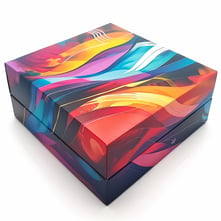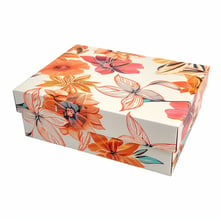


A litho laminated box is ideal for various industries, including food, retail, cosmetics, and consumer products. It is also commonly used for displays in store. Using high-quality graphics for corrugated folding cartons and flute packaging, and utilising a wide range of substrates and print methods, such as offset litho and digital printing.
Litho lamination is a process used in packaging where a printed lithographic (litho) sheet is laminated to a corrugated board. This technique combines the high-quality graphics of lithographic printing with the structural strength of corrugated cardboard.
Here's a detailed explanation of the process, cost advantages, production process, and flexibility:
 Production Process :
Production Process :
-
Design and Printing:
- A high-resolution image or design is created and printed on a thin, smooth paper using a lithographic printing press. This paper is often referred to as the "top sheet."
-
Adhesive Application:
- Adhesive is applied either to the back of the printed top sheet or to the corrugated board.
-
Mounting:
- The printed top sheet is carefully aligned and mounted onto the corrugated board. This is done using a lamination machine that ensures precise placement and bonding.
-
Bonding and Drying:
- The combined sheet goes through rollers to ensure proper bonding and to remove any air bubbles. It is then allowed to dry and set.
-
Die-Cutting and Finishing:
- The laminated boards are cut into the desired shapes and sizes, often using die-cutting machines. Additional finishing processes like folding, gluing, and assembling the boxes are performed as needed.
- The laminated boards are cut into the desired shapes and sizes, often using die-cutting machines. Additional finishing processes like folding, gluing, and assembling the boxes are performed as needed.
When considering packaging options, balancing quality and cost is crucial. Litho lamination stands out as a process that not only delivers stunning, high-resolution graphics but also offers significant cost advantages, especially for large-scale production.
Here are some key cost benefits that make litho lamination a smart choice for your packaging needs:
 Cost Advantages :
Cost Advantages :
-
High-Quality Graphics:
- Litho lamination allows for high-resolution, vibrant graphics which are essential for retail packaging and point-of-sale displays. This can enhance brand perception and attract consumers, potentially increasing sales.
-
Economies of Scale:
- For large production runs, litho lamination can be cost-effective. The setup costs for lithographic printing are high, but these are amortized over large quantities, reducing the per-unit cost.
-
Reduced Printing Costs:
- Printing directly on corrugated boards using other methods (e.g., flexographic printing) can be more expensive for achieving similar high-quality graphics. Litho lamination uses less expensive paper for high-quality prints, then combines it with cheaper corrugated material.
-
Durability and Protection:
- The laminated structure provides durability and protection for the contents, reducing damage and returns, which can be a cost-saving advantage for manufacturers and retailers.
- The laminated structure provides durability and protection for the contents, reducing damage and returns, which can be a cost-saving advantage for manufacturers and retailers.
In today's competitive market, the ability to adapt and customise packaging is essential for standing out. Litho lamination offers remarkable flexibility, accommodating various design, material, and size requirements to meet diverse branding and product needs.
Here are some ways litho lamination provides unmatched flexibility in packaging:
 Flexibility :
Flexibility :
-
Design Flexibility:
- Litho lamination supports a wide range of colors, complex designs, and finishes (e.g., gloss, matte, UV coating). This flexibility allows brands to create unique and eye-catching packaging.
-
Material Options:
- Different types of paper and corrugated board can be used, allowing customization based on the product's weight, fragility, and storage requirements.
-
Size and Shape:
- The process can accommodate various sizes and shapes of packaging, from small boxes to large display units, providing versatility in packaging design.
-
Adaptability:
- Litho laminated packaging can be easily adapted for different products and marketing campaigns without significant changes to the production process.
Summary:
Litho lamination is a process that combines high-quality lithographic printing with the structural benefits of corrugated cardboard. Its cost advantages include high-quality graphics at a lower cost for large runs, durability, and the potential for enhanced sales through better branding. The production process involves printing, adhesive application, mounting, bonding, and finishing. The process offers significant flexibility in terms of design, materials, sizes, and adaptability, making it an attractive option for manufacturers and retailers looking to create impactful and durable packaging solutions.
If you are interested in creating your own luxury packaging, or for more information on how we can help your company, then please reach out, and our expert team will guide you through every stage from concept to production.
